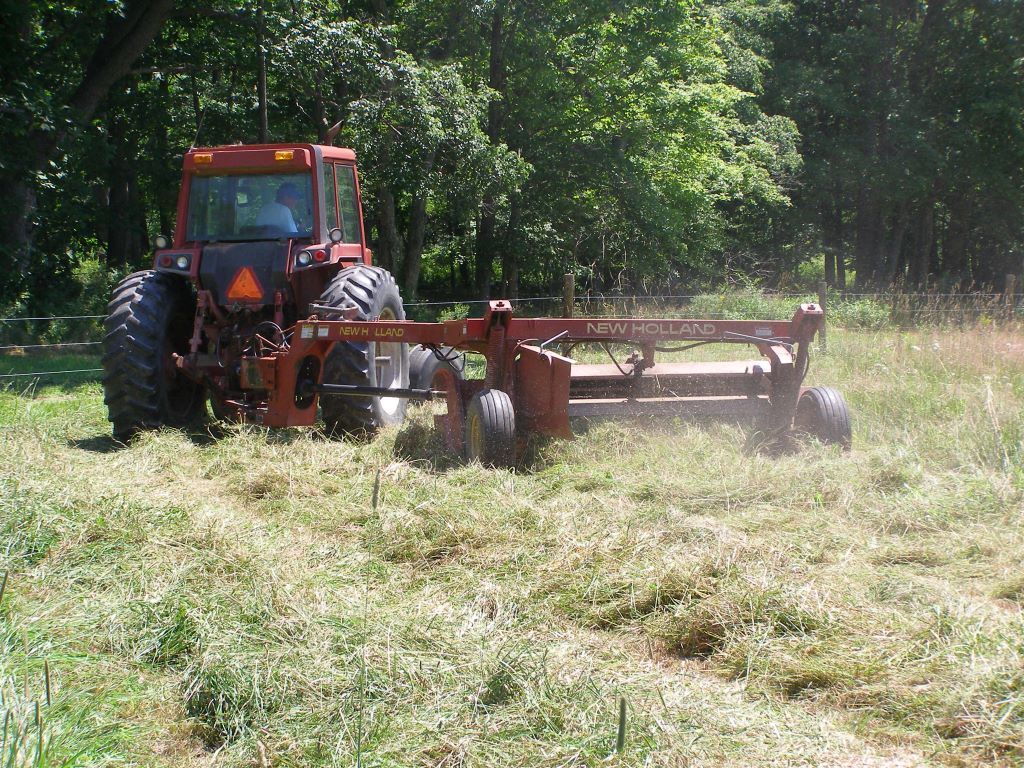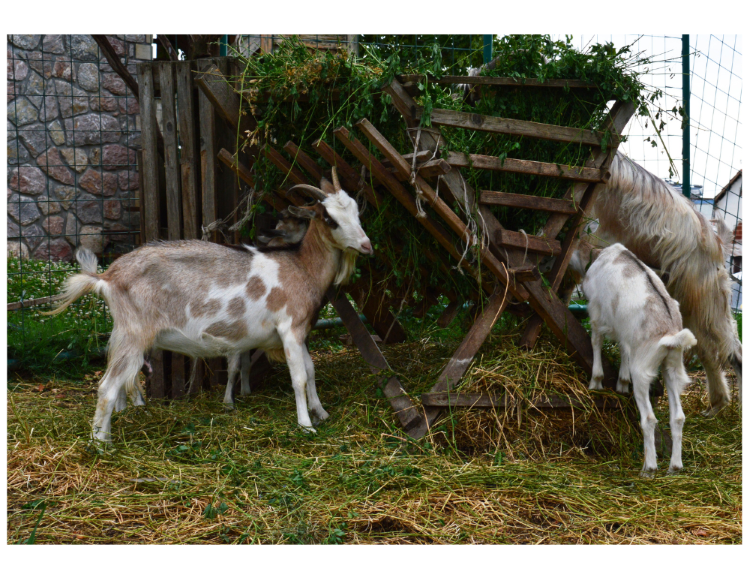Many homesteaders and hobby farmers like to keep their horses and goats in the same pasture, which is a fine practice. However, this doesn’t mean that the two animal’s foodstuffs can be intermixed or left unattended.
While horse feed is not immediately toxic to goats, it does not meet their nutritional needs in any way and must not be offered to goats long-term.
In this post we will share our own best practices when it comes to raising healthy goats and all the caveats to offering goats horse feed.

Can Horses and Goats Eat The Same Food
Yes, generally speaking goats and horses often do eat the same type of food. For example, both animals love fibrous hay!
However, in the long run goats truly require more roughage than horses and both animals have unique macro and micronutrient needs.
Goats are herbivorous ruminants, which means they have a very complex, four-stomach digestive system and are obligated to eat only plant-based foods.
Thanks to their longer digestive process, and the unique bacterias housed in their rumen, ruminants are also incredible at metabolizing low quality proteins and other “quantity over quality” nutritional foodstuff.
This is why goats are known for eating just about anything: they are natural foragers and love coarse, cellulose, and fiber rich plant materials (i.e. twigs, bark, rough prickly plants, and evergreens).
Horses, on the other hand, are simple-stomach herbivores. While they are also obligated to eat plant-based foods, they cannot metabolize dense, fibrous plant matter efficiently and rely more on grazing soft, more palatable foodstuffs such as grasses, sedges, and other herbs.
Finally, as stated, the micronutrient needs of goats and horses differ greatly. This is truly the #1 reason why it isn’t a great idea to offer lots of horse feed to your goats.
Why Horse Feed Isn’t Great For Goats
There are a few reasons why we don’t offer our goats horse feed. The most obvious are because of the nutritional imbalances that would result in goats from the inadequate or unbalanced dietary contents within horse feed.
Horses vs. Goats: Body Size and Nutritional Requirements
One of the most important factors at play when thinking about horses vs. goats is sheer difference in body size.
A horse can easily weigh 1,500lbs while even a stocky goat reaches just over 300lbs.
Obviously, the ratios and concentrations of different nutrients and minerals within prepared horse and goat feeds is going to be completely different.
As I like to say, “pound-for-pound” a goat eating horse feed is receiving a highly concentrated amount of nutrients intended for horses.
Horses vs. Goats: Salt Requirement
Salt is a specific mineral that can really cause trouble for your goats if they ingest lots of horse feed.
This is because most horse feeds will have added salts as this mineral is so important for horses. Horses require high levels of salt in their diet because:
- Salt concentration levels in their body trigger “thirst”
- Salt helps them maintain a balanced pH
- Salt assists with proper digestion of foodstuff
Goats on the other hand have their nifty rumen and a ton of bacterias to drive proper digestion and don’t rely on such a constant or high salt intake.
For example, a working horse can need up to 65g of salt per day while a goat, with their more diverse diet, requires just 0.5% of sodium in their daily dry matter and can often source some sodium from the roughage they eat.
That said, on our hobby farm we have chosen to follow the best practice of placing a salt lick for on-demand sodium uptake in our goat’s pasture. This ensures they maintain healthy amounts of sodium and supplement with the lick as much as their body deems necessary.
Warning: goats can suffer from salt poisoning! Salt poisoning results from ingesting too many salts and results in dehydration, damage to their nervous system, weakness and even death.
Horses vs. Goats: Copper Intake
Copper is another mineral that is very important for both goats and horses. Goats with a copper deficiency face a multitude of harmful symptoms, including:
- Microcytic anemia
- Lighter or faded hair color
- Infertility
- Slowed growth
- Metabolic bone disease
- Diarrhea
However, copper poisoning is just as much of a risk for goats, with the most common symptom being a sweet smelling, copper colored urine.
And a goat eating horse feed is likely to ingest way too much copper, as the natural requirement for horses is much higher than that for goats and horse feed will naturally contain higher concentrations of copper.
A goat with dangerously high levels of copper may be beyond saving, which is why copper-rich horse feed really isn’t good for goats.

All About Goat Feed: Our Best Practices
Keeping your goats happy and healthy requires that you understand their dietary needs.
For example, weaned, mature goats require about 12-35% in foraged nutrients and 86-92% in hay and concentrates.
This is why we offer our goats a rotating pasture where they can freely forage for foodstuff. We also offer our goats free access to hay, never limiting their hay intake as this food is complete fiber and very beneficial.
However, we do realize that the variety and richness of plants growing in their pasture determines the quantity and quality of macronutrients available to our goats, especially during cold winter months.
For this reason, we do offer our goats a self-serve mineral lick to ensure any deficiency is addressed as needed. We also like to supplement our goats’ diets in winter with some goat-specific grains and yummy treats.
Note: The only time we have ever offered out goats horse feed was on a winter day when we ran out of their grain mix and needed time to get to our local feed store. I decided to offer them a few handfuls of horse feed we had in the barn, but bought and returned to goat-specific feed the next day.
Read more on how to best meet your goats’ dietary needs in our post: How Much Do Goats Eat Per Day?
Can Goats Consume Horse Mix?
A mix for horses usually contains food items that are safe and healthy for goats, such as alfalfa pellets (note that these are high in protein!) peas, corn, and whole grains.
We would consider offering our goats horse mix as a last resort in winter months. That is, if you didn’t have any yummy veggies around such carrots.
Can You Feed Goats Horse Sweet Feed
The protein level in horse sweet feed is usually lower than what is needed by lactating nannies or growing kid goats.
In addition, the micronutrients within horse sweet feed is really ideal only for horses; your goats will be left majorly wanting.
While horse sweet feed may be a bit cheaper, you’re better off investing in a goat-specific sweet feed!
Can Goats Eat Sweet Feed
Yes, goats can eat goat-specific sweet feed as a dietary supplement during certain times of the year. For example, we feed our goats sweet feed or other grains when:
- We have lactating or pregnant nannies
- During cold winter months to supplement their diet
- To help a weakened goat gain reach a healthy weight
Frequently Asked Questions Related To Can Goats Eat Horse Feed
Can Goats Eat Chicken Feed?
Do not let your goats eat chicken feed. Goats cannot have chicken feed because it can result in severe bloating, diarrhea, and other serious gastrointestinal upsets and blockages.
Read more about the risks of chicken feed for goats here.
Can Goats Have Senior Horse Feed?
Senior horse feeds usually have higher crude fiber content than other horse feeds. For this reason, senior horse feed can be offered to goats, but you must look at the copper, salt, and other mineral concentrations first!
Can Horses Eat Goat Feed?
Many goat feeds contain Rumensin, a mix that increases the microbial population in the rumen of ruminant animals.
For this very reason, it can be deadly to offer your horse goat feed as the Rumenix will significantly harm the simple stomach digestive system of horses.
Final Thoughts On Can Goats Have Horse Feed
Overall, our best advice when it comes to offering your goats horse feed is summed up by the following:
- Only offer goats horse feed as a last resort, and over a short period of time
- Always read the bag of horse feed carefully before offering any to your goats
- Fibrous plant materials are much healthier for your goats than any grain or sweet feed mix
- Understand how many salts, copper, and other minerals are within the horse feed per serving size and avoid overfeeding your goats

